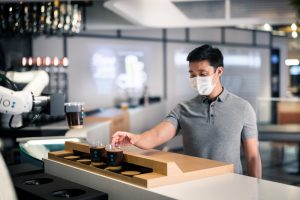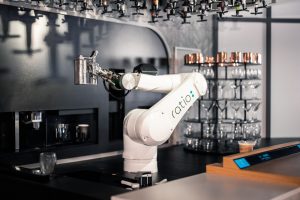The food and beverage industry is a tough line to be in—from intense competition to rising manpower and rental costs and now, a global pandemic. According to Enterprise Singapore, only 60% of small F&B businesses survive in their first five years of operation, and a third of F&B outlets are replaced each year.
To tackle the challenges of narrowing margins, the tight manpower crunch and other common issues faced by F&B owners, Singaporean company ROSS Digital has conceptualized and launched Ratio, the world’s first robotic café and lounge. A café by day and a lounge by night, Ratio has robots working hand in hand with its F&B staff—“ratiologists”—to offer “super drinks and exceptional services to consumers.”
After launching several outlets in China since 2018, it has opened its first branch in Singapore at The Centrepoint, in conjunction with JustCo, the workspace provider. Ratio serves up close to 60 drinks, from authentic Nanyang kopi to artisanal coffees and inventive cocktails. But how does it exactly work?
Assuming you would like to order a Kopi-C Gao (thick coffee with milk), you are able to use an ordering kiosk to determine the strength of your coffee. The customized order will be sent to the robot via the Cloud. While one of the robotic arms will prepare the order by dispensing the correct amount of Kopi base milk and water, another will be used concurrently to Tarik (pull) the coffee between two canisters to bring out the Nanyang Kopi flavor.
For cocktails, the robot will pick up a glass and blast freeze it using compressed carbon dioxide. The robotic shaker will then collect the ice and the ingredients, shake or stir them and pour the mix into a glass. A “ratiologist” will then add garnishing to the cocktail, before serving it.
Founder and CEO Gavin Pathross told Vulcan Post that there is a whole suite of proprietary software built into the robots—from order and inventory management systems to a CRM and POS system. On the hardware side of things, Ratio engineers have had to build some of their own kitchen equipment by “hacking and adding new IoT technology.”

For example, Gavin said that there was no ice-maker-dispenser that was able to dispense an exact quantity of ice required for cocktails through an IoT protocol. Hence, the engineers needed to create a new type of weight and dispensing mechanism that would be able to communicate with the cloud, and take inputs from users and operators. Such a precise mechanism is needed as in the world of cocktail making, “every addition 10 grams of ice will change the chemistry and taste of the drink very significantly.”
According to Gavin, the first working prototype was built in three months, and the next nine months was spent on building a commercial unit that was deployed at K11 Shanghai in 2018.
Gavin said that it started when he was working on the “Store of the Future” project for Pizza Hut and KFC five years ago. The then Chief Digital Office at Yum! Brands China faced the problems of rising rents and labor shortage, and earmarked digitalization and automation as the long-term solution.
Gavin was working on numerous solutions from table-scan-to-order, mobile pre-order, robotic food delivery, kitchen analytics, to partial kitchen automation. He was convinced that this was going to be the future of the F&B industry, and thus left his role at Yum! Brands to start Ratio 3.5 years ago.

Despite the heavy use of robots at Ratio, Gavin is convinced that they will not be able to replace the “human touch.” All of Ratio’s stores in China and Singapore are run by people, and the purpose of the robots are to relieve the staff from repetitive tasks. In fact, Gavin said that Ratio experienced a significantly lower “ratiologist” attrition rate due to increased job satisfaction.
Customers also like that they are able to engage with the “ratiologists” better, as their usual distractions are eliminated, leading to a higher repeat customer rate.
Despite the COVID-19 pandemic and economic peril that the world is experiencing, Gavin was ready to launch Ratio in accordance with its business plans. He said that because of the pandemic, traditional spaces such as hotel lobbies, restaurants and cafés are being converted into flexible workspaces—offering another opportunity for Ratio.
Furthermore, COVID-19 has accelerated the trend to automated work, and Ratio has seen an increase in demand from F&B operators seeking help in building a solution.
Indeed, the idea is set to disrupt the F&B industry, with investors backing it. Ratio has received a round of investment led by a consortium of like-minded partners comprising Frasers Property, JustCo, zVentures, ORO, and other high-profile individuals.
Ratio’s second location will be launched in November at Seletar Aerospace Park, in partnership with The Singapura Club. Gavin told Vulcan Post that the marriage of the concepts of both establishments will be a glimpse of the famous scene of the robotic bartender in the futuristic sci-fi movie The Passenger. More than a dozen outlets are in the pipeline at leading airports, malls, hotels, and co-working spaces across Asia.
This article was originally published by Vulcan Post.

